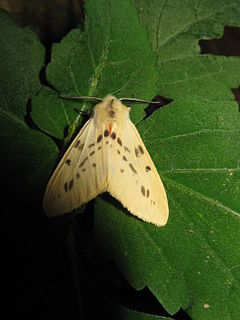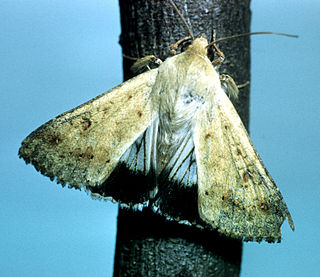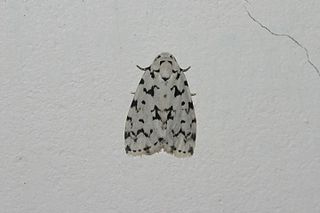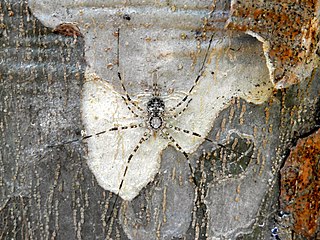
Leech Lake is a lake located in north central Minnesota, United States. It is southeast of Bemidji, located mainly within the Leech Lake Indian Reservation, and completely within the Chippewa National Forest. It is used as a reservoir. The lake is the third largest in Minnesota, covering 102,947.83 acres (416.6151 km2) with 195 miles (314 km) of shoreline and has a maximum depth of 156 feet (48 m).

The genus Satyrium contains butterflies in the family Lycaenidae. The species of this genus are found in the Holarctic ecozone. For distribution information see Further reading "Le genre Satyrium".

Aemene is a genus of moths in the family Erebidae first described by Francis Walker in 1854. They are found in Japan, throughout India and Sri Lanka.

Agylla is a genus of moths in the subfamily Arctiinae. The genus was erected by Francis Walker in 1854.

Leeches are segmented parasitic or predatory worms that belong to the phylum Annelida and comprise the subclass Hirudinea. They are closely related to the oligochaetes, which include the earthworm, and like them have soft, muscular, segmented bodies that can lengthen and contract. Both groups are hermaphrodites and have a clitellum, but leeches typically differ from the oligochaetes in having suckers at both ends and in having ring markings that do not correspond with their internal segmentation. The body is muscular and relatively solid, and the coelom, the spacious body cavity found in other annelids, is reduced to small channels.

Lemyra is a genus of tiger moths in the family Erebidae. The genus contains many species from East and South Asia, Sundaland and Australia. It was described by Francis Walker in 1856.

Helicoverpa punctigera, the native budworm or Australian bollworm, is a species of moth in the family Noctuidae. This species is native to Australia. H. punctigera are capable of long distance migration from their inland Australian habitat towards coastal regions and are an occasional migrant to New Zealand.

Anania is a genus of moths of the family Crambidae described by Jacob Hübner in 1823.

Metasia is a genus of moths of the family Crambidae.

Nacoleia is a genus of moths of the family Crambidae described by Francis Walker in 1859.

Udea is a genus of snout moths in the subfamily Spilomelinae of the family Crambidae. The genus was erected by Achille Guenée in 1845. The currently known 214 species are present on all continents except Antarctica. About 41 species are native to Hawaii.

Pyrausta is a speciose genus of moths of the family Crambidae. The genus was erected by Franz von Paula Schrank in 1802.

Syllepte is a genus of moths of the family Crambidae.

Scopula is a genus of moths in the family Geometridae described by Franz von Paula Schrank in 1802.

Homadaula is a genus of moths in the family Galacticidae.

Aemene altaica is a moth of the family Erebidae. It was described by Julius Lederer in 1855. It is found in the Russian Far East, China, Korea and Japan.
Aemene maculifascia is a moth of the family Erebidae. It was described by Frederic Moore in 1878. It is found in China and Sikkim, India.

Aemene taprobanis is a moth of the family Erebidae. It was described by Francis Walker in 1854. It is found in China (Li-Kiang), the north-western Himalayas, India, Sri Lanka and Malacca.
Aemene pseudonigra is a moth of the family Erebidae. It was described by Jeremy Daniel Holloway in 2001. It is found on Borneo. The habitat consists of upper montane forests.

Neotama is a genus of tree trunk spiders that was first described by M. Baehr & B. Baehr in 1993.
















